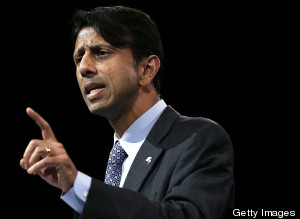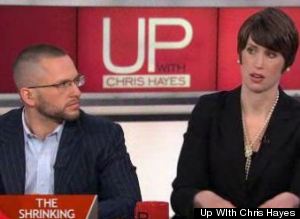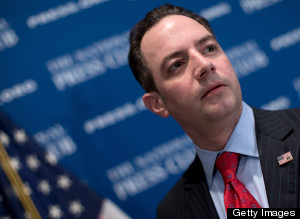
Now that the Republican National Committee has filed its "autopsy," weighing in on what went wrong for the GOP in 2012, and where to go from here, discussing the various efforts that the Republican Party has undertaken to reckon with its problems, and renew itself for the 2014 push, have once again become popular. And the tension points are everywhere. The activist base doesn't trust the establishment. A younger, more inclusion-minded set of party operators, left on the sidelines of the 2012 election cycle, don't like the old guard, who ignored their warnings.
And in recent weeks, divisions have opened within the GOP's legislative caucuses, as insurgent hopefuls like Sen. Rand Paul (R-Ky.) and Sen. Ted Cruz (R-Texas) have become embroiled in internecine spats with veterans, like Sen. John McCain (R-Ariz.) and Sen. Lindsey Graham (R-S.C.). It's "moss-covered" elites versus "wacko bird" firebrands for the soul of the Republican Party. (And if the CPAC straw poll is any measure, then score Round One for the firebrands.)
But the discussion, as they say, is ongoing. And it's long been on the proverbial winding road, from the early gut-punch of the presidential election returns, to the blame game that came soon after, to the fitful first steps into an uncertain future. It's all part of a process -- specifically, the famous process of grieving, as established by Elisabeth Kübler-Ross.
We are not the first to examine the post-2012 in this way, and chances are, we won’t be the last. But let's return to those heady post-election days, push through to CPAC and the RNC "autopsy" report, and document the whole effort to "rebrand" and renew the Grand Old Party, in its entirety. After all, it’s a process.
1. DENIAL: "What? Everything is fine!"
 Let's face it, in the late stages of the 2012 election, the only way the GOP could have gotten deeper in denial would have involved filling their pockets with stones and leaping off the Aswan Dam. Back then, everyone treated the bloodless number-crunching of pollsters as a rigged game that needed to be "unskewed" to see reality. The potency of President Barack Obama's 2008 coalition, according to the conventional wisdom of Republican elites, was a trumped-up illusion -- if it held together at all. Peggy Noonan was pretty sure that she saw Romney yard signs everywhere she looked, so surely Obama's goose was cooked.
Let's face it, in the late stages of the 2012 election, the only way the GOP could have gotten deeper in denial would have involved filling their pockets with stones and leaping off the Aswan Dam. Back then, everyone treated the bloodless number-crunching of pollsters as a rigged game that needed to be "unskewed" to see reality. The potency of President Barack Obama's 2008 coalition, according to the conventional wisdom of Republican elites, was a trumped-up illusion -- if it held together at all. Peggy Noonan was pretty sure that she saw Romney yard signs everywhere she looked, so surely Obama's goose was cooked.
In fairness, they were not bereft of a worthy rationale to fuel their doubts. Obama managed to defy gravity, in terms of the macroeconomic factors that political science teaches us makes reelection a tricky hang. But by the time the election entered its late stages, it was pretty clear that either everything that underpinned the science of polling had gone on holiday, or Obama was going to secure his win.
The ne plus ultra of Election Night reality-denying was, of course, Karl Rove's famous outburst at the Fox News Channel, who he felt was making a big mistake calling the state of Ohio for Obama. But it's not like the conversation that ensued got much saner. Haley Barbour insisted that Hurricane Sandy was breaking "Romney's momentum," and Dick Morris, days after his particularly lush predictions had failed to materialize, was still carrying that torch, and waving it in the general direction of New Jersey Gov. Chris Christie:
But the more proximate cause of my error was that I did not take full account of the impact of hurricane Sandy and of Governor Chris Christie's bipartisan march through New Jersey arm in arm with President Obama. Not to mention Christie's fawning promotion of Obama's presidential leadership.
It made all the difference.
The facts, of course, say otherwise. But the meme stuck long enough for Chris Christie to be extravagantly snubbed by CPAC organizers, who apparently felt that Donald Trump was a better figure to represent the GOP's future than a Republican governor carrying sky-high approval ratings in a traditionally blue state.
Other observers simply thought the biggest reason Mitt Romney lost was because Mitt Romney was just not sufficient as a standard-bearer. There is a bit of truth to the notion that Romney was an ally of his own demise. He spent the large part of the summer refusing to fight back against the Obama campaign's various charges. And he was an unwise and profligate spender of campaign money -- frequently overspending on ads. But most of the criticism of Romney-as-candidate failed to account for the fact that the governing concepts he acquired through his merger-and-acqusition with Paul Ryan just weren't that popular. And when the infamous "47 percent" video surfaced, plenty of those who thought Romney was insufficiently conservative needed to give voice to that divisive rhetoric more often, and more publicly.
Eventually, the conversation turned away from the vagaries of weather events and the unique faults of the candidate, toward a more critical view of the GOP’s larger institutional and philosophical failures, and how to amend them. But first, everyone had to get a little bit of rage out of their system.
2. ANGER: "It's not fair that we lost!"
 It wasn’t long after the voters’ decision had been rendered that self-appointed GOP mascot-blowhard Donald Trump was on Twitter, pounding at the keys with clenched fists, declaring the democratic process that had just spooled out to be a “disgusting injustice” and calling (hilariously!) for a “revolution.”
It wasn’t long after the voters’ decision had been rendered that self-appointed GOP mascot-blowhard Donald Trump was on Twitter, pounding at the keys with clenched fists, declaring the democratic process that had just spooled out to be a “disgusting injustice” and calling (hilariously!) for a “revolution.”
Yeah, it wasn’t the Donald’s finest hour, but the next time Trump has a “finest hour” will probably be the first time. But Trump was far from alone in quickly pivoting to unbridled anger. As the New York Daily News reported:
Rocker and Romney supporter Ted Nugent also went on a Twitter tirade.
“Pimps whores & welfare brats & their soulless supporters hav (sic) a president to destroy America,” he wrote. “Goodluk (sic) America u just voted for economic & spiritual suicide. Soulless fools.”
Another dramatic reaction came from conservative radio host Bryan Fischer, who compared the vote to an infamous attack on America.
“Today was Pearl Harbor. Tomorrow we begin planning for Normandy,” he wrote.
And before a fortnight had passed, residents from all 50 states had taken to the White House’s online petition tool to ... well ...ask the White House for permission to secede from the United States. “Peacefully grant the State of Alabama to withdraw from the United States of America and create its own NEW government,” read one, which garnered the then-necessary amount of signatures to prompt a reply from the White House. (The White House has since raised the signatures threshold from 25,000 to 100,000.)
Eventually, however, the flailing fury found a specific target, the GOP establishment’s elite cadre of consultants and fundraisers. And as HuffPost's Jon Ward reported, Karl Rove found himself painted with a broad bullseye:
Many of the lightning bolts were aimed at none other than Karl Rove, the former Bush administration political genius who oversaw the deployment of nearly $400 million in campaign spending through outside groups American Crossroads and Crossroads GPS toward the presidential race and toward numerous Senate and House races.
"The billionaire donors I hear are livid," one Republican operative told The Huffington Post. "There is some holy hell to pay. Karl Rove has a lot of explaining to do … I don't know how you tell your donors that we spent $390 million and got nothing."
And the furor over the millions of dollars that Rove is said to have wasted hasn’t subsided. During the CPAC conference, sometime Alaska Gov. Sarah Palin, sparring for relevance, took aim at Rove, saying, "The last thing we need is Washington, D.C., vetting our candidates ... the architects can head on back to the great Lone Star state and put their names on some ballot."
But Rove already has an answer for his critics.
3. BARGAINING: "We need to do the same things, only differently."
 In February 2013, Rove announced that he was going to take greater care of his establishment donor boodle by going on offense against “other organizations that have helped defeat establishment Republican candidates over the last two election cycles.” The baseline goal: keep people like Missouri Rep. Todd Akin, who won the 2012 Senate primary and immediately handed the embattled Democratic incumbent Claire McCaskill what she needed to prevail when he made his famous pronouncement on “legitimate rape.” Akin’s outburst went viral in a hurry, and pretty soon, the entire party was being tarred with the same brush.
In February 2013, Rove announced that he was going to take greater care of his establishment donor boodle by going on offense against “other organizations that have helped defeat establishment Republican candidates over the last two election cycles.” The baseline goal: keep people like Missouri Rep. Todd Akin, who won the 2012 Senate primary and immediately handed the embattled Democratic incumbent Claire McCaskill what she needed to prevail when he made his famous pronouncement on “legitimate rape.” Akin’s outburst went viral in a hurry, and pretty soon, the entire party was being tarred with the same brush.
And so Rove established the Conservative Victory Project, aiming to kneecap the sorts of contenders who could win primaries and then hobble the GOP’s overall electoral hopes with their antics. Mind you, it’s not that Rove has any particular objection to conservatives towing the traditional line on social issues -- he’s not seeking to necessarily moderate the GOP’s stance on women’s issues, abortion, or LGBT rights. He just wants to elevate the sort of candidate who has the presence of mind to keep his (or her) (but let’s face it, mostly “his") trap shut about it.
Rove would not be alone in this effort. Louisiana Gov. Bobby Jindal drew waves of hype for calling out his own party along similar lines. In his address to the RNC winter meeting, Jindal declaimed, “We've got to stop being the stupid party. It's time for a new Republican Party that talks like adults." Finding common cause with Rove, he went on to say, "We had a number of Republicans damage the brand this year with offensive and bizarre comments. I'm here to say we've had enough of that."
And yet, this critical stance hasn't seemed to have provided Jindal any insight into whether the GOP was pursuing stupid policies, alongside the occasional stupid outbursts. Whether there’s any merit in that sort of self-examination, Jindal has not hesitated to keep at the “business as usual” approach to policy-making. His current proposal is to eliminate Louisiana’s state income tax, offsetting the revenue losses (most of them, anyway) by raising the state’s sales tax -- a move that would effectively levy higher taxes on the bottom 80 percent of his state’s residents. It’s hard to say why residents of an already low-service state would exchange higher taxes for less government, but Jindal’s theory seems to be that this sort of policy becomes acceptable so long as nobody gives voice to their troglodytic notions about rape.
This is not to say that the GOP, chastened by the results of 2012 election, has completely looked past the possibility of policy adjustments. Far from it, actually. Losing the Latino vote has given new life to conservatives who historically backed comprehensive immigration reform -- a breed of Republican that went into hibernation during the years between the 2010 tea party takeover and Romney’s failed run, when the GOP’s nativist base was in the ascension. Since November, there’s been a rapid course correction, and Florida Sen. Marco Rubio has emerged as the new-blood leader of immigration reform. His personal background helps him relate to the immigration experience, while his street cred helps him shepherd reform through the thicket of right-wing media.
That’s a fairly fast, deeply substantive response to the election results. More recently, the conversion of Sen. Rob Portman (R-Ohio) to the side of marriage equality continues a steadily increasing wave of support for the LGBT community from the GOP.
For the most part, however, the GOP seems content to stick with the plan that led to ruin in 2012. The party is still trying to pass the Paul Ryan budget, still flirting with taking the debt ceiling hostage, still maniacally averse to including revenues in any debt reduction deal -- and that’s despite the offer that Obama’s put on the table that combines a conservative plan for revenue with a conservative plan for entitlement reform, in exchange for... well, pretty substantial spending cuts as well. (The entire deficit debate is pretty funny, because both the House GOP caucus and Obama seem to proceed from the position that Obama lost the election, and yet, no deal is in sight.)
Taken as a whole, though, the GOP seems to be following the theories espoused by West Virginia national committeewoman Melody Potter, at the RNC’s winter meeting: “We don’t need a new pair of shoes; we just need to shine our shoes.”
4. DEPRESSION: "There's no hope."
 There’s an old cliche, speaking to the way political partisans respond to electoral defeats, that goes something like this: when liberals lose election, they turn into mopey sad-sacks, whereas when conservatives lose elections, they get angry. Certainly there’s some truth to this -- the rise of the tea party was essentially born from a grievance that Obama had won an election. But it doesn’t always hold. Lots of progressives are continually despondent, even after winning. And conservatives can remain irate, even when they are ascending.
There’s an old cliche, speaking to the way political partisans respond to electoral defeats, that goes something like this: when liberals lose election, they turn into mopey sad-sacks, whereas when conservatives lose elections, they get angry. Certainly there’s some truth to this -- the rise of the tea party was essentially born from a grievance that Obama had won an election. But it doesn’t always hold. Lots of progressives are continually despondent, even after winning. And conservatives can remain irate, even when they are ascending.
Nevertheless, 2012 losses stoked no small amount of depressing among conservatives, typically of the “we’ve lost our country” variety of inconsolate blubbering. Ann Coulter’s post-election woe ran along these lines: “We have more takers than makers and it's over. My country that no longer is interested in conservative ideas than it is interested in handouts.” That was pretty much Mitt Romney’s post-election self-analysis as well:
Mitt Romney told his top donors Wednesday that his loss to President Obama was a disappointing result that neither he or his top aides had expected, but said he believed his team ran a “superb” campaign with “no drama,” and attributed his rival’s victory to “the gifts” the administration had given to blacks, Hispanics and young voters during Obama’s first term.
Obama, Romney argued, had been “very generous” to blacks, Hispanics and young voters. He cited as motivating factors to young voters the administration’s plan for partial forgiveness of college loan interest and the extension of health coverage for students on their parents’ insurance plans well into their 20s. Free contraception coverage under Obama’s healthcare plan, he added, gave an extra incentive to college-aged women to back the president.
Elsewhere, Fox News infotainer Bill O’Reilly lamented that the “white establishment is now the minority,” and that, “it’s not a traditional America anymore.” Both of these views contain a certain amount of doleful nihilism. Getting past the “makers and takers” argument would go a long way toward dismantling the GOP’s perpetual alienation machine, and coming to grips with changing demographics would enable the GOP to expand their tent and sharpen their arguments.
But when it comes to indulging in defeatism, nothing comes as close as the briefly-mounted campaign, in some states that had grown less favorable to conservatives, to just alter the Electoral College system and game the mechanisms in favor of the GOP. GOP lawmakers in several swing states -- including Virginia, Pennsylvania, Wisconsin, Michigan, and Florida -- mounted efforts to change the winner-take-all allocation of electoral votes to a system that would give heavy preference to apportioning electoral votes by congressional districts.
This is definitely one way of admitting that the policies your party has long espoused have alienated enough voters that you can no longer win national elections! But instead of a “rebranding” effort, this tells the world, “Piss it, we’re not even going to try to relate to voters anymore.” As Alex Pareene wrote: “It’s a stunning admission of irrelevance.” That’s probably why these efforts mostly foundered -- though Pennsylvania Republicans are doing their best to keep mope alive.
5. ACCEPTANCE: "We need to make adjustments."
 The good news for the GOP’s efforts at renewal is that throughout this long, dark, teatime of the soul, there have been plenty of voices that have emerged to offer the wayward party a clearer path toward restoration -- though all of them require some tough reckonings.
The good news for the GOP’s efforts at renewal is that throughout this long, dark, teatime of the soul, there have been plenty of voices that have emerged to offer the wayward party a clearer path toward restoration -- though all of them require some tough reckonings.
Republican strategist Liz Mair, for example, offered a lengthy and thoughtful piece on the state of the contemporary GOP, and how to get back on a competitive footing. Mair has long been a strong proponent of marriage equality. She touches on the need to step into the modern world in her missive, as well as calling for a more humane way of approaching the Hispanic community, better technology, and an end to reign of failed consultants. But a key part of her message is for the GOP to stop devouring their moderate members:
Everyone knows that Todd Akin, Christine O’Donnell and Sharron Angle were not good candidates. What a lot of people don’t seem to recognize is that their opponents, even though they looked like they would perform better based on on-paper attributes, were even worse candidates. How do I know this? They lost to Todd Akin, Christine O’Donnell and Sharron Angle. I’m serious. Think about that for a minute.
Now, I come from the more moderate end of the GOP, and cut my teeth as a blogger as an advocate for moderate Republicans. A lot of people in that part of the party will be inclined to respond to this criticism by saying, “no, they weren’t worse candidates, it’s just that the party is so extreme that more moderate/mainstream candidates can’t win over the base.”
And it pains me to say it, but this is simply not true, and I’m going to throw out several names to prove it to you: Mark Kirk. Kelly Ayotte. Carly Fiorina. Dan Coats.
Over at Bloomberg View, Josh Barro has turned his column into a source of perpetual urgings for the GOP to rethink its whole view of economics. Barro believes that the GOP should not become “like the Democratic Party" -- and mounts an admirable, compelling case that there are conservative economic principles with outstanding merit. His contention is that the Republican Party currently devalues its own economic brand by clinging to notions that repel the average voter: “Conservatives say tight money and lower top tax rates would enrich middle-class families. But that's wrong, and if they figured that out, they might stop supporting tight money and lower top tax rates.”
Barro also has no idea why the “government is always bad” meme has taken hold so unshakeably among establishment Republicans:
In the states, the Republican focus on cost containment and efficiency works best when it is combined with a commitment to providing high-quality government services and an understanding that government can and should be useful. Republican governors' talk about improving their states' governments contrasts with national Republican rhetoric, which tends to cast government as an impediment to freedom and growth.
Such a balanced approach is the reason that New Jersey Gov. Christie has approval ratings in the 70s, or that governors like John Kasich in Ohio and Susana Martinez in New Mexico did the math and accepted Medicaid expansion funds that will benefit their constituents, instead of dying on the hill of opposition to Obamacare.
(As the image above indicates, Mair and Barro recently appeared on an all-conservative panel on MSNBC's "Up With Chris Hayes," where, joined by the Daily Caller Foundation's Jim Antle and Americans for Tax Reform's Mattie Duppler, they discussed the issue of "rebranding" the GOP.)
And of course, you have the young and hungry activists who were left on the bench in 2012, even as their warnings to the old guard were proving prophetic. Robert Draper wrote the essential piece on those latter-day Cassandras, chronicling the struggles of Republican technologist par-excellence Patrick Ruffini -- who absorbs innovation like a sponge and synthesizes his own competitive ideas -- and pollster Kristin Soltis Anderson, who discovered that at ground-level, voters were turned off by the GOP’s perceived philosophies.
But if there’s one throughline that strings Mair’s moderation, Barro’s economic prescriptives, Ruffini’s urgent desire to get campaign technology into the 21st century, and Anderson’s focus-group analytics, it’s simply this: a basic desire to do nothing more complicated than deepening the GOP’s connection with the electorate, accepting that their problems are real, their needs worth addressing.
 And finally, we come to Reince Priebus and his “autopsy,” which frankly has got one foot in Acceptance, and the other dragging limply across the field of Bargaining.
And finally, we come to Reince Priebus and his “autopsy,” which frankly has got one foot in Acceptance, and the other dragging limply across the field of Bargaining.
As Benjy Sarlin rounds up, there’s a lot of merit in what the “autopsy” suggests. There’s an urgent call to get immigration reform passed, work harder at minority outreach, continue to use the statehouses as a laboratory for effective governance, and to defuse the perception that the Republicans are the party of the moneyed class. And the “autopsy” goes a bit further than merely asking the Todd Akins of the world to put a fist in their mouths and leave it there in perpetuity -- as McKay Coppins notes, the “autopsy” pretty much frosts social conservatives entirely, seemingly progressing from Mitch Daniels’ famous request for an agreed-to “social truce” to an insistence on it.
But in our previous analysis of the autopsy, we found a lot of things wanting. There is the suggestion that the GOP “convene national and state focus groups with non-Republican ethnic groups in an effort to gain insight as to real and perceived issues affecting their communities.” But if the Republican Party is still grappling with voters’ under the impression that they have merely got to alter their perceptions of their “problems,” there’s not going to be any meaningful dialogue between party elites and the electorate at large.
In a similar vein, the autopsy calls for the GOP to do a better job competing in the “celebrity endorsement” space. This is a lot of effort for minimal gain -- perhaps the Democratic Party can brag about the relative Q-rating of their celebrity fans, but this is mile-wide, inch-deep territory. Beyonce’s affection for Barack Obama isn’t going to move the needle with pocketbook voters, it’s just going to guarantee that the Inaugural Balls are more swank. What’s more, the GOP’s current cadre of celebrity backers seem to largely want to cash in on the rattling-the-extremes racket. It would perhaps be best if the GOP just conceded whatever teensy advantage the Democrats derive from this, and move on to more profitable efforts.
Nevertheless, if Charlie Cook is correct in his assessment that the choice the GOP faces is either “change or go over the cliff,” the very fact that the autopsy even exists means that they’re at the very least keeping one foot on the firmament. But change is never easy. Reince Priebus is already starting to edge away from the “autopsy,” and the entire effort has been blasted by some conservative luminaries, incensed that the Republican Party would dare change a thing about itself.
All of which would send everyone hurtling back toward denial, right? Well, as noted before, it’s a process. A sometimes cyclical, neverending process.
[Would you like to follow me on Twitter? Because why not?]